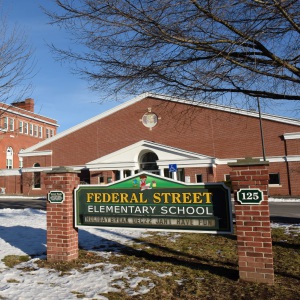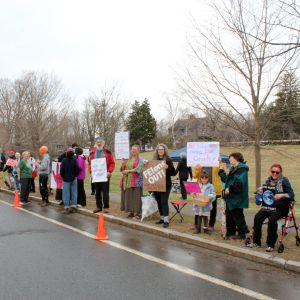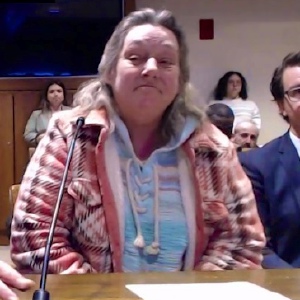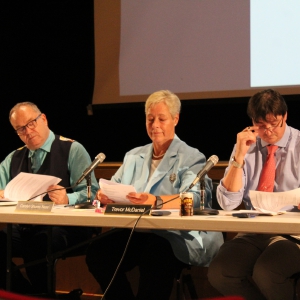From Global to Local: What I want my tax money spent on

Pat Hynes
| Published: 04-01-2024 5:56 PM |
In June 2023, Amanda Jones, an African American who had recently given birth to her second daughter Miranda, died from pregnancy-related causes. Her state, Georgia, ranks among the least safe states in the country for women to give birth; and the vast majority of women who die during and after pregnancy are poor and disproportionately African American. Though Amanda and her partner worked, they did not have health insurance and she was only eligible for Medicaid coverage for up to 12 months after the birth of her child, none for prenatal care and none after 12 months. The majority of the nearly 26 million uninsured people are low-income families with at least one worker, with no health care coverage through their job and who cannot afford the high cost of private insurance.
I want my taxes to help fund universal health care for everyone in our country. All but 43 countries offer free health care or access to health care for at least 90% of their citizens. Why cannot we, the world’s wealthiest nation for over 60 years, divorce ourselves from corporate capitalist health care?
What of other social and economic issues as we near Tax Day? Take poverty: 140 million people, 40% of US people, are poor or near poor, defined as one emergency away from economic ruin, according to the Poor People’s Campaign. The “140 million” are people of every race, ethnicity, age, faith, sex and sexual orientation, while poverty is highest among Black, Latino and Indigenous peoples due to systemic racism. More women than men are poor due to systemic sexism. The pay gap between women and men, 21.8% on average, has persisted for 30 years, an injustice that deteriorates our democracy.
I want my federal and state taxes to lift people out of poverty and end inequality in income. It can be done. Cities are leading the way in raising minimum wage; and they outpace the best states, while the federal minimum wage languishes at a despicable $7.25 per hour.
These 10 cities have the highest minimum wage in the U.S.
■Tukwila, Washington: $20.29.
■Seattle, Washington: $19.97.
■SeaTac, Washington: $19.71.
Article continues after...
Yesterday's Most Read Articles
 Federal Street School substitute teacher alleged to have called student racial slur
Federal Street School substitute teacher alleged to have called student racial slur
 PHOTOS: Greenfield celebrates Earth Day with parade, festivities
PHOTOS: Greenfield celebrates Earth Day with parade, festivities
 Local protests against Trump administration continue as part of 50501 movement
Local protests against Trump administration continue as part of 50501 movement
 Mother whose daughter died in Holyoke marijuana facility backs bill for worker safety
Mother whose daughter died in Holyoke marijuana facility backs bill for worker safety
 Greenfield Police Logs: March 25 to April 6, 2025
Greenfield Police Logs: March 25 to April 6, 2025
 HS Roundup: Mohawk Trail softball earns first win of the season following 16-4 victory over Mahar
HS Roundup: Mohawk Trail softball earns first win of the season following 16-4 victory over Mahar
■West Hollywood, California: $19.08.
■Mountain View, California: $18.75.
■Emeryville, California: $18.67.
■Sunnyvale, California: $18.55.
■Denver, Colorado: $18.29.
Today, the highest minimum wages, by state and Washington, D.C., are in D.C., ($17), Washington ($16.28), California ($16), Connecticut ($15.69) and New Jersey ($15.13). New York has raised its minimum hourly wage in New York City and its suburbs to $16.
But we need to do much better. A livable wage in Connecticut, that is, an hourly wage that enables a single adult to pay for necessities, including housing, food, utilities, transportation and health care, would be $24.13. Overall, most single Americans need to earn at least $20/hour to pay their bills, given cost of living where they live. More than one third fall short.
I want my federal and state tax money used to raise minimum wage to a livable wage in the name of economic justice for everyone.
In 2023, the Department of Defense (aka the Department of War) was allocated $816.7 billion dollars in our national budget, while failing to pass its sixth straight audit. US war spending in 2023 dwarfs that of other countries, totaling more than the next 10 highest military budgets combined. Since October 7, the gunboat-diplomacy Biden administration has approved over 100 weapons sales to the government of Israel, an average of 1 every 36 hours.
I want my tax money to “beat swords into plowshares” by supplanting masculinist militarism with intelligent, committed, unrelenting diplomacy that lifts our country above our wretched ranking as the 131st least peaceful country out of 163 countries on the Global Peace Index.
Our arduous path back from flawed to healthy democracy will only be through engaged citizens, activist organizations and unions in cities and some states not shackled in the stranglehold of anti-abortion, anti-immigrant, Trumpian, and extreme religious right politics; nor held hostage by their weapons manufacturers.
■“Voters in California, Vermont and Michigan in November adopted amendments to enshrine abortion protections into their respective state constitutions.” More states are expected to advance similar measures, because constitutional protections are considered the most ironclad and are very difficult to amend.
■In February 2024, the city of Flint Michigan recently approved a universal cash program for babies, called Rx Kids, that provides new mothers $1,500 and $500 monthly for their child’s first year.
■The same month, Detroit became the largest U.S. city so far to pass a ”Move the Money” resolution, following the lead of neighboring city Hamtramck, Michigan. The measure, approved unanimously by the City Council, calls on the U.S. Congress and the president to shift public money away from the military to fund social services.
■In June 2023 the US Conference of Mayors unanimously passed a resolution “Calling for Urgent Action to Avoid Nuclear War, Resolve the Ukraine Conflict, Lower Tensions with China, and Redirect Military Spending to Meet Human Needs.”
■More than 70 U.S. cities, including Chicago and Seattle, have passed resolutions on the genocidal Israel-Gaza war with most calling for a permanent cease-fire, exchange of Israeli hostages and Palestinian political prisoners and free flow of aid to the Gazan people. Recently Northampton, Amherst, and Greenfield passed cease-fire resolutions.
I want my taxes to be used for our real national security: lifting people out of poverty, hunger and homelessness; providing universal health care; ensuring affordable housing for everyone who needs it, assuring a livable wage, ending violence against women, affirming Black Lives Matter, and fostering peace.
Pat Hynes, of Montague, is a board member of the Traprock Center for Peace and Justice.






 John Babits: Democrats and gang members
John Babits: Democrats and gang members Cathy Marcum: Greenfield Senior Center vibrant and welcoming
Cathy Marcum: Greenfield Senior Center vibrant and welcoming Rita Detweiler: There is more that unites us than divides us
Rita Detweiler: There is more that unites us than divides us Pat Ryan: Keep Tim Hilchey on the job!
Pat Ryan: Keep Tim Hilchey on the job!
